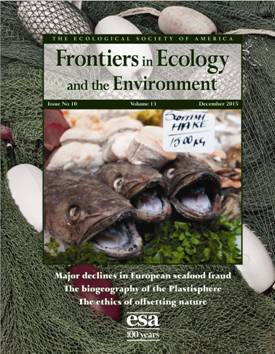Participação de dois investigadores do IPMA em publicação que faz capa de revista cientifica
 2015-12-07 (IPMA)
2015-12-07 (IPMA)
Nova publicação com a participação dos investigadores do IPMA, Rogério Mendes e Helena Silva, sobre identificação de espécies de peixes na Europa faz capa na Frontiers in Ecology and the Environment deste mês. O estudo é parte do projeto LABELFISH financiado pelo programa da Área Atlântica da União Europeia.
Cientistas de seis países (Alemanha, Espanha, França, Irlanda Portugal e Reino Unido) analisaram amostras de espécies de peixes com maior consumo, como bacalhau, atum, pescada e solha provenientes de supermercados, mercados e peixarias em 19 cidades europeias. Das 1563 amostras analisadas, cujo DNA foi sequenciado, apenas 77 (4,9%) tinham sido substituídas por outras espécies de diferente valor comercial.
Os resultados mostram que em conjunto com a legislação recente, as novas técnicas de identificação genética das espécies podem garantir uma maior fiabilidade e transparência na cadeia de comercialização de pescado e maior segurança para os consumidores tendo sido verificado um número mais reduzido de casos de substituição das espécies rotuladas
Low mislabeling rates indicate marked improvements in European seafood market operations
Stefano Mariani1*, Andrew M Griffiths1, Amaya Velasco2, Kristina Kappel3, Marc Jérôme4, Ricardo I Perez-Martin2, Ute Schröder3, Veronique Verrez-Bagnis4, Helena Silva5, Sara G Vandamme1, Belgees Boufana1, Rogerio Mendes5, Marc Shorten6, Cat Smith6, Elizabeth Hankard1, Samantha A Hook1, Alice S Weymer1, Daryl Gunning6, and Carmen G Sotelo2
Over the span of a decade, genetic identification methods have progressively exposed the inadequacies of the seafood supply chain, revealing previously unrecognized levels of seafood fraud, raising awareness among the public, and serving as a warning to industry that malpractice will be detected. Here we present the outcome of the latest and largest multi-species, transnational survey of fish labeling accuracy to date, which demonstrates an apparent sudden reduction of seafood mislabeling in Europe. We argue that recent efforts in legislation, governance, and outreach have had a positive impact on industry regulation. Coordinated, technology-based, policy-oriented actions can play a pivotal role in shaping a transparent, sustainable global seafood market and in bolstering healthier oceans.
1Ecosystems & Environment Research Centre, School of Environment & Life Sciences, University of Salford, Greater Manchester, UK2
*(s.mariani@salford.ac.uk)
2Instituto de Investigaciones Marinas (CSIC), Vigo, Spain
3Max Rubner-Institute, Department of Safety and Quality of Milk and Fish Products, Kiel, Germany
4Ifremer, rue de l'Ile d'Yeu, Nantes, France
5Portuguese Institute for the Sea and Atmosphere, Lisbon, Portugal
6Indigo Rock Marine Research Station, Cork, Ireland
Referência:
Stefano Mariani, Andrew M Griffiths, Amaya Velasco, Kristina Kappel, Marc Jérôme, Ricardo I Perez-Martin, Ute Schröder, Veronique Verrez-Bagnis, Helena Silva, Sara G Vandamme, Belgees Boufana, Rogerio Mendes, Marc Shorten, Cat Smith, Elizabeth Hankard, Samantha A Hook, Alice S Weymer, Daryl Gunning, and Carmen G Sotelo 2015. Low mislabeling rates indicate marked improvements in European seafood market operations. Frontiers in Ecology and the Environment 13: 536–540. http://dx.doi.org/10.1890/150119

